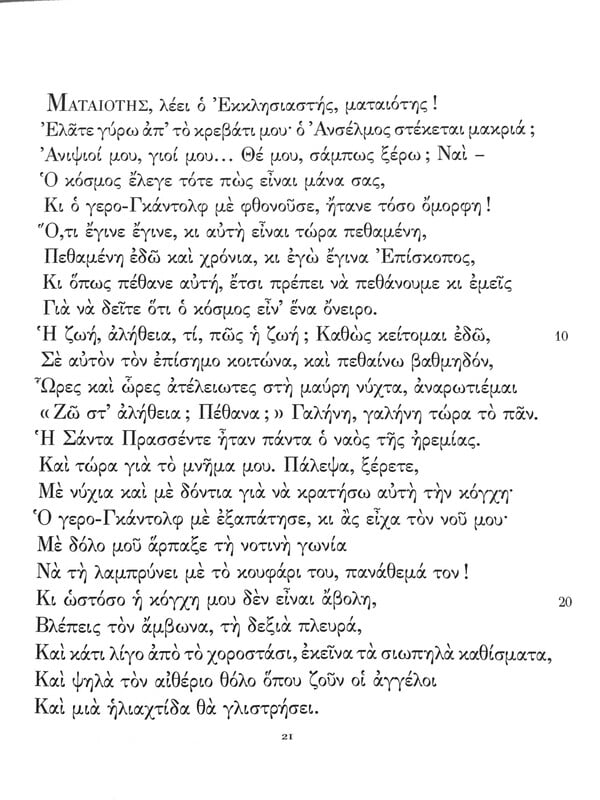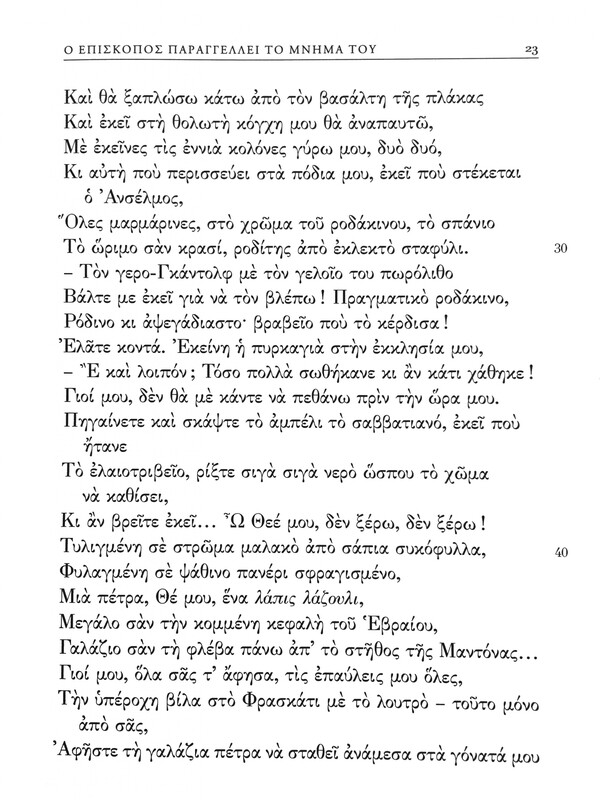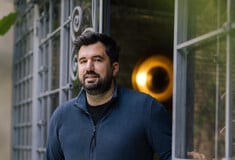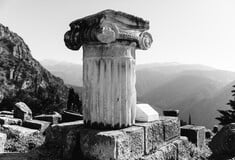Ο Επίσκοπος παραγγέλλει το μνήμα του στην εκκλησία της Σάντα Πρασσέντε
Oι δυο πρώτες σελίδες από τη μετάφραση στα ελληνικά του εκπληκτικού ποιήματος του Robert Browning
Το ποίημα αυτό (τις δυο πρώτες σελίδες του οποίου αναδημοσιεύουμε εδώ) εμφανίστηκε στο περιοδικό Hood's Magazine τον Μάρτιο του 1845 (ο Μπράουνιν ήταν τριαντατριών ετών) και αμέσως μετά στη συλλογή του Dramatic Romances and Lyrics.
Η βασιλική της Αγίας Πραξέδης (Santa Prassede στα ιταλικά) βρίσκεται στη Ρώμη, κοντά στη βασιλική Santa Maria Maggiore. Οικοδομήθηκε τον 8ο αιώνα για να στεγάσει τα οστά της Αγίας Πραξέδης, ευλαβούς παρθένου, κόρης πλουσίου Ρωμαίου συγκλητικού, που έζησε τον 2ο μ.χ. αιώνα και δώρισε τα πλούτη της στους φτωχούς και στην Εκκλησία. Ο Μπράουνιν είχε επισκεφθεί τη Santa Prassede τον Οκτώβρη του 1844.
Ο Επίσκοπος του ποίηματος είναι πρόσωπο φανταστικό αλλά χαρακτηριστικό της εποχής της Αναγέννησης.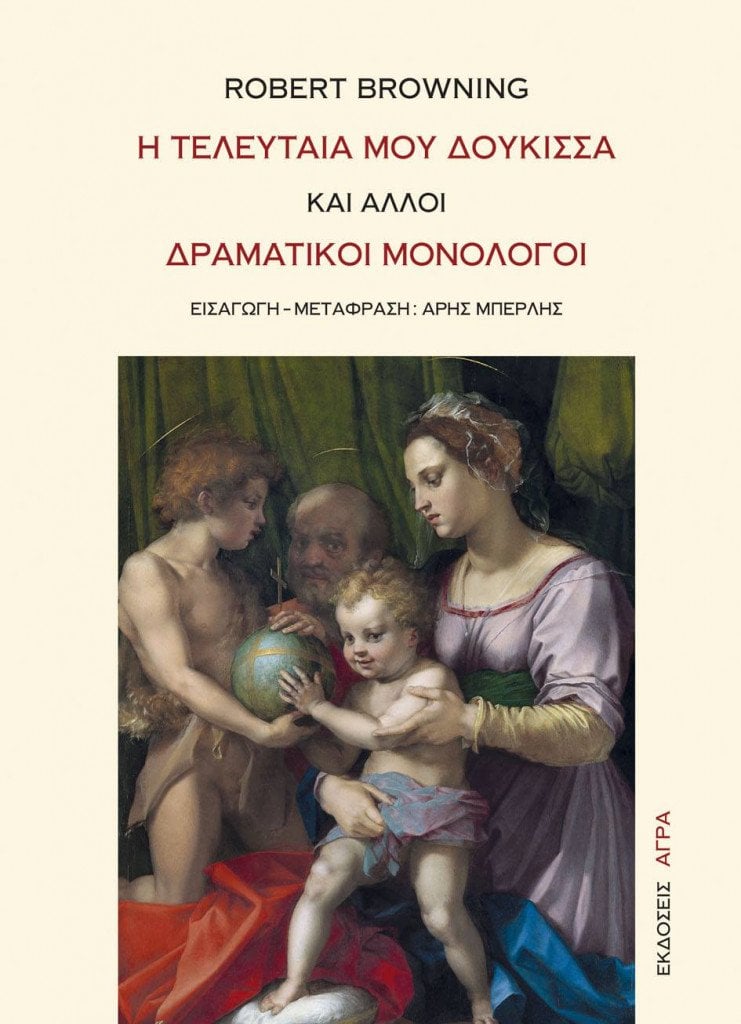 Το ποίημα είναι ένας δραματικός μονόλογος και η κριτική το έχει ιδιαίτερα τιμήσει, θεωρώντας το αντιπροσωπευτικό και κορυφαίο δείγμα του είδους. Είναι σε ιαμβικό ανομοιοκατάληκτο πεντάμετρο. Για τον «Επίσκοπο» ο φημισμένος κριτικός της Αναγέννησης Τζων Ράσκιν έγραψε:
Το ποίημα είναι ένας δραματικός μονόλογος και η κριτική το έχει ιδιαίτερα τιμήσει, θεωρώντας το αντιπροσωπευτικό και κορυφαίο δείγμα του είδους. Είναι σε ιαμβικό ανομοιοκατάληκτο πεντάμετρο. Για τον «Επίσκοπο» ο φημισμένος κριτικός της Αναγέννησης Τζων Ράσκιν έγραψε:
«Δε γνωρίζω άλλο κομμάτι της αγγλικής λογοτεχνίας, ποίησης ή πεζού, όπου να λέγονται τόσο πολλά όσο σε αυτούς τους στίχους, για το πνεύμα της Αναγέννησης –την εγκοσμιότητα, την ασυνέπεια, την υπερηφάνεια, την υποκρισία, την έλλειψη αυτοσυνειδησίας, τη λατρεία της τέχνης, της πολυτέλειας, των καλών λατινικών. Είναι σχεδόν όλα όσα είπα για την Αναγέννηση σε τριάντα σελίδες του βιβλίου μου The Stones of Venice» (John Ruskin, Modern Painters, Λονδίνο, 1843, IV, xx, 34).
(Στοιχεία από τις Σημειώσεις του βιβλίου, εκδ. Άγρα)
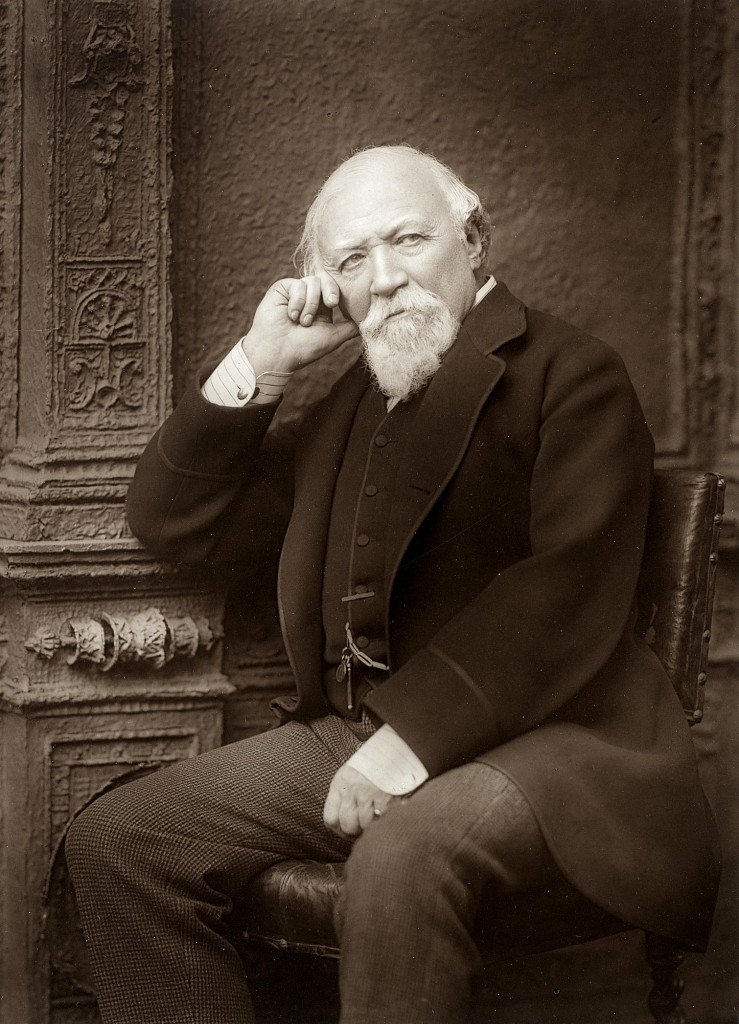
Ο ROBERT BROWNING (1812-1889) ήταν Άγγλος ποιητής και θεατρικός συγγραφέας, ένας από τους διασημότερους της βικτωριανής περιόδου. Υμνήθηκε για την τελειοποίηση του ποιητικού είδους του δραματικού μονολόγου. Τα ποιήματά του διακρίνονται για την ειρωνεία και το μαύρο χιούμορ τους, τις αναφορές τους σε κοινωνικά και ιστορικά γεγονότα, την ιδιοσυγκρασιακή ιδιαιτερότητα των χαρακτήρων τους, το απαιτητικό λεξιλόγιο και τη σύνταξή τους. Άσκησε μεγάλη επίδραση σε συγγραφείς όπως ο Henry James, ο Oscar Wilde, ο George Bernard Shaw, ο G.K. Chesterton, ο Ezra Pound, ο Jorge Luis Borges και ο Vladimir Nabokov. Ήταν σύζυγος της επίσης σπουδαίας Αγγλίδας ποιήτριας Elizabeth Barrett.
Σημαντικότερα ποιήματά του είναι τα Childe Roland to the Dark Tower Came, Fra Lippo Lippi, Andrea Del Sarto και My Last Duchess. Στα πιο δημοφιλή του ποιήματα συγκαταλέγονται τα Porphyria's Lover, How They Brought the Good News from Ghent to Aix, Meeting at Night, το πατριωτικό Home Thoughts from Abroad και το παιδικό The Pied Piper of Hamelin. Η ζωντανή ηχογράφηση του How They Brought The Good News είναι μάλλον η παλαιότερη σωζόμενη ηχογράφηση σημαντικού προσώπου στη Μεγάλη Βρετανία.
―Από τις Σημειώσεις του βιβλίου
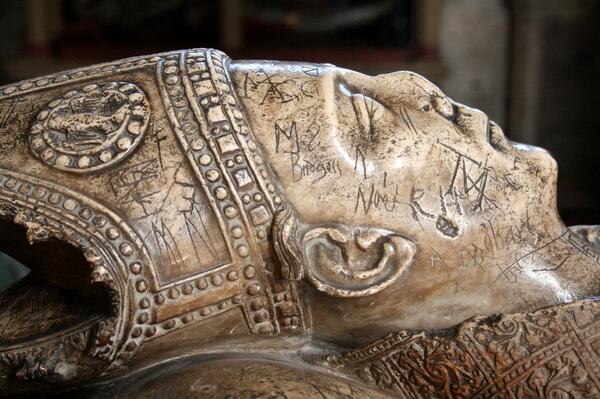
To ποίημα στη γλώσσα που γράφτηκε
"The Bishop Orders His Tomb at Saint Praxed's Church"
Vanity, saith the preacher, vanity!
Draw round my bed: is Anselm keeping back?
Nephews — sons mine . . . ah God, I know not! Well —
She, men would have to be your mother once,
Old Gandolf envied me, so fair she was!
What's done is done, and she is dead beside,
Dead long ago, and I am Bishop since,
And as she died so must we die ourselves,
And thence ye may perceive the world's a dream.
Life, how and what is it? As here I lie
In this state-chamber, dying by degrees,
Hours and long hours in the dead night, I ask
"Do I live, am I dead?" Peace, peace seems all.
Saint Praxed's ever was the church for peace;
And so, about this tomb of mine. I fought
With tooth and nail to save my niche, ye know:
— Old Gandolf cozened me, despite my care;
Shrewd was that snatch from out the corner South
He graced his carrion with. God curse the same!
Yet still my niche is not so cramped but thence
One sees the pulpit o' the epistle-side,
And somewhat of the choir, those silent seats,
And up into the aery dome where live
The angels, and a sunbeam's sure to lurk;
And I shall fill my slab of basalt there,
And 'neath my tabernacle take my rest,
With those nine columns round me, two and two,
The odd one at my feet where Anselm stands:
Peach-blossom marble all, the rare, the ripe
As fresh-poured red wine of a mighty pulse.
— Old Gandolf with his paltry onion-stone,
Put me where I may look at him! True peach,
Rosy and flawless: how I earned the prize!
Draw close: that conflagration of my church
— What then? So much was saved if aught were missed!
My sons, ye would not be my death? Go dig
The white-grape vineyard where the oil-press stood,
Drop water gently till the surface sink,
And if ye find . . . Ah God, I know not, I! . . .
Bedded in store of rotten fig-leaves soft,
And corded up in a tight olive-frail,
Some lump, ah God, of ,
Big as a Jew's head cut off at the nape,
Blue as a vein o'er the Madonna's breast . . .
Sons, all have I bequeathed you, villas, all,
That brave Frascati villa with its bath,
So, let the blue lump poise between my knees,
Like God the Father's globe on both his hands
Ye worship in the Jesu Church so gay,
For Gandolf shall not choose but see and burst!
Swift as a weaver's shuttle fleet our years:
Man goeth to the grave, and where is he?
Did I say basalt for my slab, sons? Black —
'T was ever antique-black I meant! How else
Shall ye contrast my frieze to come beneath?
The bas-relief in bronze ye promised me,
Those Pans and Nymphs ye wot of, and perchance
Some tripod, thyrsus, with a vase or so,
The Saviour at his sermon on the mount,
Saint Praxed in a glory, and one Pan
Ready to twitch the Nymph's last garment off,
And Moses with the tables . . . but I know
Ye mark me not! What do they whisper thee,
Child of my bowels, Anselm? Ah, ye hope
To revel down my villas while I gasp
Bricked o'er with beggar's mouldy travertine
Which Gandolf from his tomb-top chuckles at!
Nay, boys, ye love me — all of jasper, then!
'T is jasper ye stand pledged to, lest I grieve.
My bath must needs be left behind, alas!
One block, pure green as a pistachio-nut,
There's plenty jasper somewhere in the world —
And have I not Saint Praxed's ear to pray
Horses for ye, and brown Greek manuscripts,
And mistresses with great smooth marbly limbs?
— That's if ye carve my epitaph aright,
Choice Latin, picked phrase, Tully's every word,
No gaudy ware like Gandolf's second line —
Tully, my masters? Ulpian serves his need!
And then how I shall lie through centuries,
And hear the blessed mutter of the mass,
And see God made and eaten all day long,
And feel the steady candle-flame, and taste
Good strong thick stupefying incense-smoke!
For as I lie here, hours of the dead night,
Dying in state and by such slow degrees,
I fold my arms as if they clasped a crook,
And stretch my feet forth straight as stone can point,
And let the bedclothes, for a mortcloth, drop
Into great laps and folds of sculptor's-work:
And as yon tapers dwindle, and strange thoughts
Grow, with a certain humming in my ears,
About the life before I lived this life,
And this life too, popes, cardinals and priests,
Saint Praxed at his sermon on the mount,
Your tall pale mother with her talking eyes,
And new-found agate urns as fresh as day,
And marble's language, Latin pure, discreet,
— Aha, ELUCESCEBAT quoth our friend?
No Tully, said I, Ulpian at the best!
Evil and brief hath been my pilgrimage.
All lapis, all, sons! Else I give the Pope
My villas! Will ye ever eat my heart?
Ever your eyes were as a lizard's quick,
They glitter like your mother's for my soul,
Or ye would heighten my impoverished frieze,
Piece out its starved design, and fill my vase
With grapes, and add a vizor and a Term,
And to the tripod ye would tie a lynx
That in his struggle throws the thyrsus down,
To comfort me on my entablature
Whereon I am to lie till I must ask
"Do I live, am I dead?" There, leave me, there!
For ye have stabbed me with ingratitude
To death — ye wish it — God, ye wish it! Stone —
Gritstone, a-crumble! Clammy squares which sweat
As if the corpse they keep were oozing through —
And no more lapis to delight the world!
Well go! I bless ye. Fewer tapers there,
But in a row: and, going, turn your backs
— Ay, like departing altar-ministrants,
And leave me in my church, the church for peace,
That I may watch at leisure if he leers —
Old Gandolf, at me, from his onion-stone,
As still he envied me, so fair she was!


